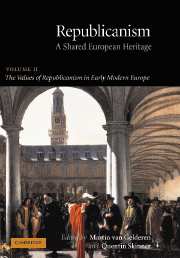Book contents
- Frontmatter
- Contents
- Contents of Volume I
- Acknowledgments
- Introduction
- Part I Republicanism and Political Values
- Part II The Place of Women in the Republic
- Part III Republicanism and the Rise of Commerce
- 10 Republicanism and Commercial Society in the Scottish Enlightenment: The Case of Adam Ferguson
- 11 Scots, Germans, Republic and Commerce
- 12 Neo-Roman Republicanism and Commercial Society: The Example of Eighteenth-century Berne
- 13 Republicanism and Commercial Society in Eighteenth-century Italy
- 14 Republicanism, State Finances and the Emergence of Commercial Society in Eighteenth-century France – or from Royal to Ancient Republicanism and Back
- 15 Commercial Realities, Republican Principles
- Bibliography
- Contributors
- Index of Names of Persons
- Index of Subjects
10 - Republicanism and Commercial Society in the Scottish Enlightenment: The Case of Adam Ferguson
Published online by Cambridge University Press: 11 January 2010
- Frontmatter
- Contents
- Contents of Volume I
- Acknowledgments
- Introduction
- Part I Republicanism and Political Values
- Part II The Place of Women in the Republic
- Part III Republicanism and the Rise of Commerce
- 10 Republicanism and Commercial Society in the Scottish Enlightenment: The Case of Adam Ferguson
- 11 Scots, Germans, Republic and Commerce
- 12 Neo-Roman Republicanism and Commercial Society: The Example of Eighteenth-century Berne
- 13 Republicanism and Commercial Society in Eighteenth-century Italy
- 14 Republicanism, State Finances and the Emergence of Commercial Society in Eighteenth-century France – or from Royal to Ancient Republicanism and Back
- 15 Commercial Realities, Republican Principles
- Bibliography
- Contributors
- Index of Names of Persons
- Index of Subjects
Summary
In 1969, in the final pages of his book Utopia and Reform in the Enlightenment, Franco Venturi remarked that ‘we are still waiting for a comprehensive study of the Scottish Enlightenment’ and that this would be ‘one of the most necessary pieces of research in the field of eighteenth century European history’ (Venturi 1971: 133). Almost thirty years later, Knud Haakonssen, in the introduction to a collection of essays, remarked instead that ‘despite the extraordinary variety of fruitful approaches to the Scottish Enlightenment that has emerged in recent years, there seems still to be an unaccountable hankering for the total history of the Scottish Enlightenment’ (Haakonssen 1996: 8). So, almost thirty years have gone by, and a comprehensive work on the Scottish Enlightenment has yet to be written and, if we take Haakonssen's remark seriously, it may be that this work cannot and should not be written.
During the last few decades, research on the Scottish Enlightenment has certainly developed enormously. Thanks to numerous studies on the eighteenth-century Scottish thinkers and on the most diverse aspects of Scottish culture, it has become clear that the phrase ‘Scottish Enlightenment’ does not describe a unitary experience, but is merely a convenient expression for a multitude of heterogeneous phenomena. Scholars have recently tended to talk less about the Scottish Enlightenment in general and more about specific aspects of the movement – in Glasgow, Edinburgh, Aberdeen and elsewhere (see Carter and Pittock (eds.) 1987; Hook and Sher (eds.) 1995).
- Type
- Chapter
- Information
- RepublicanismA Shared European Heritage, pp. 177 - 196Publisher: Cambridge University PressPrint publication year: 2002
- 10
- Cited by



